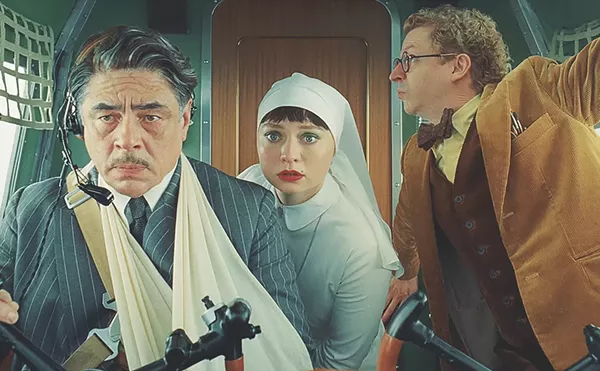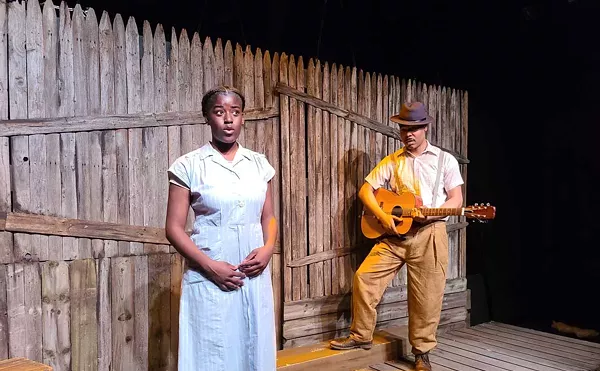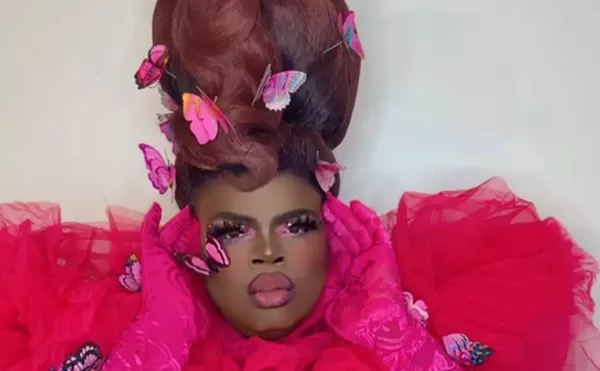
Audio By Carbonatix
[
{
"name": "GPT - Leaderboard - Inline - Content",
"component": "35519556",
"insertPoint": "5th",
"startingPoint": "3",
"requiredCountToDisplay": "3",
"maxInsertions": 100,
"adList": [
{
"adPreset": "LeaderboardInline"
}
]
}
]
Our Souls Have Grown
Deep Like the Rivers:
Black Poets Read Their Works
Audio CD
By Scott-Heron, Angelou, Brooks
2 Discs, $29.97
'I've known rivers / ancient dusky rivers / my soul has grown deep like the rivers" -- these are words written by an 18-year-old Langston Hughes, performed by a 51-year-old Hughes, and a fitting opening for an immense collection of African-American spoken-word performance spanning nearly a century. Rhino/Word Beat's latest audio anthology, Our Souls Have Grown Deep Like the Rivers: Black Poets Read Their Works, covers 80 years of verse, running the gamut from a speech by NAACP co-founder W.E.B. DuBois to the rap of Public Enemy. The two-disc anthology is the first comprehensive collection of its kind, archiving recordings from the Library of Congress, radio programs, albums, and readings around the country. African-American literati, like Maya Angelou, Rita Dove, Gwendolyn Brooks, and Nikki Giovanni, are showcased, as are lesser-known voices like slam veterans Tracie Morris and Saul Williams. As a tangible, audible chunk of history, Our Souls is an invaluable glimpse into the African-American psyche over the last century -- the kind of primer that no textbook could offer.
History professors might consider DuBois' excerpt from "The Atlantic Years" in their lesson plans. Literature students should have the opportunity to actually hear Gwendolyn Brooks read "We Real Cool," her voice meandering like be-bop and capturing the essence of wayward youth in a minimalist 24 lines, or Maya Angelou's voice, draped honey-like over the seductive "To a Man." The Last Poets also pump up the collection with a 1970s-era, politically charged throw-down that suggests high-energy performance poetry existed long before poetry slams. The audience laughter in response to Lucille Clifton's "Admonitions" makes one feel present for the 1974 recording at a D.C. museum -- a feeling you just can't get from a book.
The second CD continues chronologically, showcasing a few younger voices and reflecting the modern struggles and achievements of African Americans, while proving that poetry is not above pop culture but intertwined with it. In "Poem for Magic," an ode to Magic Johnson, Quincy Troupe celebrates the triumph of the game, and Ntozake Shange, author of for colored girls who have considered suicide when the rainbow is enuf, infuses a love poem to Bob Marley with a reggae backbeat. Public Enemy's "Black Steel in the Hour of Chaos" is the only piece representative of rap and hip-hop as poetry. It's a bit of a sore thumb, as if it were included solely to hook younger buying audiences. Though pioneers in the rap movement, Public Enemy are surely not the first nor the only artists to elevate rap to the annals of poetry. While rap is somewhat thin, the slam poets on the compilation link their work to the oral African-American tradition of poetry with a heavy emphasis on diction. Tracie Morris' voice winds through "Project Princess" like acid jazz, elevating the ghetto-shaped, young female to saint status. In "Ohm," a selection from the 1996 National Poetry Slam, Saul Williams addresses the divine connection of the African American with the cosmos: "Niggers be like spinnin' windmills, braidin' hair, lockin', poppin', as the sonic force of the soul keeps the planets rockin' ... 'cause niggers got a peace treaty with Martians, and we been keepin' 'em up to date with sacred jibberish like 'sho nuff' and 'it's on.'" Williams pays homage to rap and hip-hop by emulating turntable scratching and juxtaposing it with the meditative refrain: "ohm."
These poets sharpened their skills in the boot camp of poetry slams and were subjected to its sport-like victories and losses. Carl Hancock Rux addresses the modern dilemma of the African-American artist, seduced by images of "sold-out" slam poets and million-dollar rappers. In "No Black Male Show," he reads: "yes ... you be dreamin' of record deals & winning poetry slams ... Warning: The slam judges don't know the difference 'tween a sestina & a simile ... Warning: Broadway is only interested in you posthumously / Warning: Publishers aren't buying books 'bout nothing but your tragedy."
The breadth of this spoken-word collection is nothing short of astounding. It also, in light of a diminishing and unrepresentative market for written poetry, looks to be the future. As Al Young, who reads on the CD and also provided the liner notes, recently remarked in Billboard, "Poetry, like music, doesn't live on the page. Having worked as a teacher, I know the teaching of poetry can be difficult if restricted to just text or analysis of text. [With spoken-word] you're actually taking in an incalculable amount of information that far outdoes the page's possibilities."
Our Souls Have Grown Deep Like the Rivers brings a century of pages to life and proves that poetry is more than just printed words, but artistic craft reaching back to a people's origins and linking disparate pieces of today's cultural puzzle.





